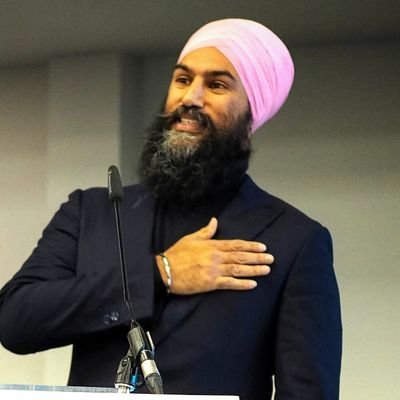Throne, Altar, Liberty
The Canadian Red Ensign

Wednesday, March 10, 2021
Jagmeet Doesn’t Know Jack!
In the 2011 Dominion election, under the leadership of Jack Layton, the New Democratic Party which is the officially socialist party, as opposed to the unofficial socialist parties such as the Liberals and the Conservatives, won the highest percentage of the popular vote and the most number of seats it has ever received. While the Conservatives, led by Stephen Harper, won the election and formed a majority government, Layton’s NDP won enough seats to become Her Majesty’s Loyal Opposition, a role which, during Conservative governments, had always before been held by the Liberals. While the unpopularity of Grit leader Michael Ignatieff undoubtedly contributed to this, it was clearly a credit to the charismatic leadership of Layton himself. Sadly, he was not able to perform the role of Official Opposition Leader for long. Cancer forced him to step down from his duties and in August of that year took his life.
In the 2019 Dominion election, by contrast, the NDP’s percentage of the popular vote fell drastically, and it moved from third party to fourth party status as it lost twenty seats from the forty-four it had won four years previous. What is very interesting about this is that this was the same election in which the Liberal government dropped from majority to minority government status. The Liberal drop was not difficult to explain – the year had begun with the government rocked by the SNC-Lavalin scandal and during the election campaign itself another scandal, which would have utterly destroyed anyone else, broke, as multiple photographs and even a video of the Prime Minister, who had marketed himself as the “woke” Prime Minister, in blackface surfaced. What was surprising was not that the Liberals dropped in the popular vote and lost seats, but that they managed to squeak out a plurality and cling to power. This makes it all the more damning that the New Democrats, ordinarily the second choice for progressive Liberal voters, did so poorly in this election.
Just as most of the credit for the NDP’s success in 2011 belonged to its late leader Jack Layton, so most of the blame for its failure in 2019 belongs to its current leader, Jagmeet Singh. Despite the efforts of the CBC and its echo chambers in the “private” media to promote his brand, Singh, was clearly unpalatable to the Canadian public. Whereas a competent politician who finds himself unpopular with the electorate would ask what it is about himself that is turning off the voters and try to change it, Singh is the type who declares that the problem is with the electorate, that they are too prejudiced, and demands that they change. That this attitude, indicative of the kind of far Left politics Singh embraces – he is the furthest to the Left any mainstream party leader has ever been in Canadian politics – is itself a large part of what turns the voters off, is a fact that eluded him, continues to elude him, and will probably elude him forever.
That the contrast could hardly be greater between the late Jack Layton and Jagmeet Singh received another illustration this week.
On Sunday, a much hyped interview between Oprah Winfrey and the Duke and Duchess of Sussex was televised. I did not watch the interview, as I make it a point of avoiding Oprah who, in my opinion, has done more than anybody else to turn people’s minds to mush, despite having a book club named after her. The Sussexes consist of Meghan Markle, an ambitious American actress, and her husband, the younger son of the Prince of Wales. Last year, you might recall, this couple was all over the news before they got pre-empted by the bat flu, because Markle, who obviously is the one wearing the pants between the two of them, having learned that unlike the Hollywood celebrity to which she had aspired, royalty comes with public duties as well as privilege, duties which do not include, and indeed conflict with, the favourite Hollywood celebrity pastime of shooting one’s mouth off, no matter how ill-informed one is, about every trendy, woke, cause, wanted to keep the royal privileges while giving up the royal duties, and was told, quite rightly, by the Queen, that this was not the way things were done. The couple left the UK in a huff, stopping temporarily in Canada before they eventually relocated to the United States. As I said, I did not watch the interview, but have caught enough of the highlights of it and the post-interview commentary to know that it was basically Markle throwing herself a “me party” and hurling mud at her inlaws and the ancient institution they represent, for not making everything all about her.
Sane, rational, people surely realize that interviews of this sort speak far more about the spoiled, egotistical, narcissism of the individuals who give such interviews than they do about the people and institutions criticized in such interviews. People like Jagmeet Singh, however, regard them as opportunities to promote their own agendas.
Singh, actually succeeded in making the current Prime Minister look classy by comparison, something which is exceedingly difficult to do. The only comment the Prime Minister made following the interview was to say “I wish all members of the Royal Family the very best”. Singh, however, ranted about how he doesn’t “see the benefit of the monarchy in Canadians’ lives”. As with Markle’s interview this comment says far more about the person who made it than the institution he seeks to denigrate.
To fail to see the benefit of the monarchy in Canadians’ lives is to fail to see any benefit to Canadians in a) having their country remain true to her founding principles, b) having a non-political head of state, or c) having an institutional connection to the United Kingdom, Australia, and the other Commonwealth Realms that in no way impedes our country’s sovereignty over her own domestic affairs and international relationships. To fail to see any benefit in any of this is to display one’s own blindness.
That Canada’s founding principles require her to retain the monarchy is an understatement. Loyalty to the monarchy is the founding principle of Canada, at least if by Canada we mean the country that was founded in 1867. Quebec nationalists like to point out that Canada was first used for the French society founded along the St. Lawrence long before Confederation, which is true enough, but the conclusions they draw from this are contradictory non-sequiturs. At any rate, the original French Canada was, most certainly, a society under a monarch, the monarchy of France, and, contrary to the delusions of the Quebec nationalists who are products of the “Quiet Revolution” (against traditional, Roman Catholic, Quebecois society and culture), it was not moving in the direction of the French Revolution when the French king ceded Canada to the British king after the Seven Years War, a fact that is evinced by Quebec’s remaining ultramontane in its Catholicism and seigneurial in its society long after the Jacobins had done their worst in France. Before Confederation began the process of uniting all of British North America into the Dominion of Canada in 1867 – the Canada we speak of as Canada today – an English Canada, in addition to a French Canada, had come into existence, and this English Canada grew out of the United Empire Loyalists, that is to say, those among the Thirteen Colonies which revolted against Britain and become the United States who remained loyal to the Crown, and fled to Canada to escape persecution in the new republic. They were able to flee to Canada because French Canada, although the ink was barely dry on the treaty transferring Canada from the French king to the British, did not join in the American Revolution against the Crown which had, to the upset of the American colonists, guaranteed its protection of their culture, language and religion. During Confederation, the Fathers of Confederation, English and French, unanimously chose to retain a connection to the larger British Empire and to make the Westminster system of parliamentary monarchy our own (it was Canada’s own Fathers of Confederation, not the Imperial government in London, who brought all of this into the Confederation talks, and, indeed, when the Fathers of Confederation wished to call the country “The Kingdom of Canada”, London’s input was to suggest an alternative title, leading to the choice of “The Dominion of Canada’). It is the Crown that is the other party to all of the treaties with the native tribes, who generally, and for good cause, respect the monarchy a lot more than they do the politicians in Parliament. At several points in Canadian history, both on the road to Confederation, such as in the War of 1812, and after Confederation, such as in both World Wars, English Canadians, French Canadians, and native Canadians fought together for “king and country”. The monarchy has been the uniting principle in Canada throughout our history. To reject the monarchy is to reject Canada.
That anybody in March of 2021 could fail to see the benefit of having a non-political head of state demonstrates the extent to which ideology can blind a person. Four years ago, the American republic had an extremely divisive presidential election after which the side that lost refused to acknowledge the outcome, spent much of four years accusing the winner of colluding with a foreign power – Russia – to steal the election, and giving its tacit and in some cases explicit approval to violent groups that were going around beating people up, using intimidation to shut down events, and rioting, because they considered the new American president to be a fascist. Last year, they held another presidential election which was even more divisive, with a very high percentage of Americans believing the election was stolen through fraud, with the consequence that Congress had to order a military occupation of their own capital city in order to protect the inauguration of the new president against their own citizens. This is precisely the sort of thing that naturally ensues from filling the office of head of state through popular election, politicizing an office that is supposed to be unifying and representative of an entire country. This is not the first time in American history that this has happened. Less than a century after the establishment of the American republic, the election of the first president from the new Republican Party led to all of the states south of the Mason-Dixon line seceding from the American union and forming their own federation, which the United States then invaded and razed to the ground in the bloodiest war in all of American history. Generally, when a country replaces its hereditary monarchy it initially gets something monstrously tyrannical which may eventually evolve into something more stable and tolerable. When the British monarchy was temporarily abolished after the English Civil War and the murder of Charles I, the tyranny of Cromwell was the result, which was fortunately followed by the Restoration of the monarchy. In France, forcing the Bourbons off the throne resulted in the Jacobin Reign of Terror. The forced abdication of the Hapsburg and Hohenzollern dynasties after World War I led directly to the rise of Adolf Hitler, whereas the fall of the Romanovs in Russia brought about the enslavement of that country to Bolshevism. To wish to get rid of the hereditary monarchy in Canada is to fail to learn anything at all from history.
I won’t elaborate too much on the third point. Either you see an advantage in the Commonwealth arrangement in which the Realms share a non-political, hereditary monarchy, but each Realm’s Parliament has complete control of its own affairs, or you do not. Jagmeet Singh does not appear to care much for Canada’s relationship with other Commonwealth countries. Take India for example. The relationship is a bit different because India is a republic within the Commonwealth rather than a Commonwealth Realm, but it still illustrates the point. As embarrassing as the present Prime Minister’s behaviour on his trip to India a few years ago was, the relationship between the two countries would be much worse in the unlikely event Jagmeet Singh were to become Prime Minister. He would probably not even be allowed into India. Eight years ago he was denied an entry visa – the first elected member of a Western legislature to be so denied – because of his connection with the movement that wishes to separate the Punjab from India and turn it into a Sikh state called Khalistan, a movement that is naturally frowned upon in India where it has been responsible for countless acts of terrorism (it has committed such acts in Canada too). Asked about it at the time, Singh placed all the blame for any harm done to the two countries relationship on India.
Which leads me back to where this essay started. Just as Singh could not see that his support for the movement that produced the bombing of Air India Flight 182 in 1985 may possibly be a legitimate reason for India to ban him from their country and blamed any deterioration in the relationship between the two countries on India, so he cannot see that anything he has said or done could possibly be a reason why his party did so poorly in the last Dominion election and places the blame on the prejudices of Canadians.
If by some miracle he were to come a self-awaking and realize that instead of demanding that Canadians change in order to accommodate him that there might be something objectionable about him that he ought to be trying to fix, a logical step for him to take would be to try and emulate the last leader in his own party who truly had popular appeal. If he were to do so, he would learn that that leader had a radically different attitude toward our country’s founding principles and fundamental institutions than his own.
The Honourable Jack Layton, the son of former Progressive Conservative MP Robert Layton, had this to say:
Some people think the NDP may want to get rid of the monarchy but I assure you that’s absolutely not the case. My dad was a big time monarchist and so am I.
Jagmeet should try to be more like Jack. He would be less of an ass if he did.
Posted by Gerry T. Neal at 7:50 AM





